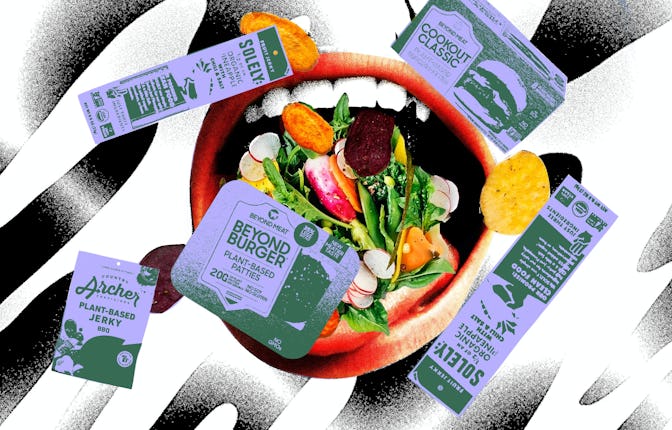This plant-based meat is the surprising favorite of nutritionists
Spoiler alert: You can’t get it at a fast food chain.

In the past decade, the meatless meat market has kind of exploded. In the olden days — aka the 90s — vegetarians basically had to choose between salty, hard-pressed cardboard and bland, mushy cardboard as meat alternatives. Nowadays, though, plant-based meats — especially plant-based ground beef and burgers — literally bleed for our attention. But are all fake meats equally healthy and tasty? I contacted nutritionists to weigh in on what to look for and what to avoid when shopping for plant-based meat.
First of all, it’s crucial to remember that fake meat brands and companies are in the market for different reasons. “Some are designed to appeal to meat lovers as a plant-based alternative, with the look and feel of actual meat,” Maddie Pasquariello, a registered dietician in Brooklyn, tells Mic. These are products like Impossible Burger or Beyond Burger, which are meant to mimic the meat-eating experience as closely as possible. Others are designed simply to be healthy meat alternatives and don't necessarily taste like meat, cook like meat, or even resemble meat at all, Pasquariello explains.
So when you shop for plant-based meat alternatives, you should first consider what you want out of fake meat. Do you want it to look and taste like animal meat, provide a good source of protein and other nutrients, be good for the environment, or some combination?
The best meat imposters also tend to be the most processed.
If you’re trying to find the most meat-like experience, Impossible Burger and Beyond Burger are tops, and they have the added benefit of being greener than most actual meat, Dana Ellis Hunnes, a registered dietitian in Los Angeles, assistant professor at UCLA Fielding School of Public Health, and author of Recipe for Survival: What You Can Do to Live a Healthier and More Environmentally Friendly Life, tells Mic. “Beyond and Impossible Burgers have good flavor, but are higher in processed products that are also higher in saturated fats,” she says. That doesn’t mean they’re bad for you, per se, but Hunnes recommends against making them an everyday staple.
Plant-based meat made of whole foods is more nutritious.
“Typically, the most nutritious plant-based meat you'll find will be the ones made from whole, simple ingredients,” Pasquariello says. She recommends reading the labels to make sure that what you’re buying contains fiber, protein, and limited additives.
And, Hunnes notes, you should be especially vigilant about the sodium content and fat. “[Plant-based meats] are still a highly processed food, and they often have a lot of sodium added to them, and depending on the brand, a lot of saturated fat,” she explains.
If you’re not educated about how to read food labels, Pasquariello has some advice. “Try to look for plant-based meat alternatives that contain at least 8-10g protein per serving (or more — some offer upwards of 20-30g), with at least 5g fiber per serving, and 300mg of sodium or less per serving,” she says.
But don’t just focus on the nutritional content; look at the ingredients, too. “Ingredients that sound like an actual food tend to be less processed and healthier than those that are highly processed and unrecognizable,” Hunnes says.
Nutritionist’s recommended plant-based meats may be surprising.
One of Pasquariello’s favorites is a black bean burger made by the brand Actual Veggies. “These contain plenty of protein, as well as fiber, and have zero saturated fat. The ingredient list is super simple, and they're high in vitamin A and magnesium, while being relatively low in sodium — a lot of bang for your buck,” she says. While they may be a relatively unknown option, a quick search reveals they’re in the refrigerated section of several grocery stores, as well as a few online markets.
Hunnes likes Dr. Praeger’s Perfect Burgers best because they contain recognizable ingredients and have a healthier nutritional profile than a lot of processed food. In fact, many of the dozens of dietitians I contacted for this article said these veggie burgers are their favorite, citing the good balance of taste and nutrition. Frankly, I was surprised by this; I’ve been vegetarian for decades and never tried these. The packaging looks a bit medical, and I’m always skeptical of products packaged under a doctor’s name — shades of Dr. Atkin’s — but it just goes to show that you can’t judge a burger by its cover.
You probably shouldn’t eat plant-based meat every day.
I don’t know who needs to hear this, but you shouldn’t eat meat at every meal, even if it’s plant-based. “I would be hard pressed to say that any vegan meat burgers are a ‘health’ food,” Hunnes says. “Most of them are not a health food, nor are they necessarily meant to be health foods. They are an environmentally friendly and humane food, and as a vegan myself, from those two perspectives, I recommend vegan meats as a ‘treat’ food or a once-a-week food, rather than an everyday food — but animal meats should not be an everyday food either.”